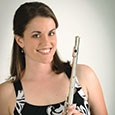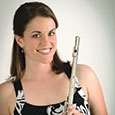Question: Why should I attend a summer music festival or camp?
Answer: When I was in middle school, I attended my first summer music camp at Texas Tech University. This band camp was a 10-hour drive from my home and took a whole week of my precious summer. When I arrived, I was overwhelmed by the number of flutists attending. My teacher, Lisa Garner Santa, ended up becoming my undergraduate flute professor, mentor, and now colleague and friend. By the end of that week I had developed close friendships, fallen more in love with music, played in a flute choir and woodwind quintet for the first time, and progressed significantly on flute. The challenge of being around much more advanced flutists generated a great deal of excitement that motivated me all year.
Summer programs generally have a specific focus, such as band, orchestra, chamber music, or flute performance. Each is geared to the age and playing ability of the student.
Band Camps
Band camps for middle school and high school flutists are often held at a local college or university. Usually, they last a week with the days spent in band rehearsals, private lessons, and masterclasses as well as possibly electives and recreation. I first played in a flute choir and woodwind quintet at a band camp elective class. Typically, there is a flutes-only class where the teacher works on the technical demands of the music, blending, and intonation. The camp ends with a concert.
Orchestra Festivals
These are geared towards high school and college students planning a career in music. Some of the most well-known festivals are Aspen, Interlochen, Brevard, Tanglewood, Eastern, and Sewanee. A typical day includes orchestra rehearsals, sectionals, chamber music coaching, theory class, conducting lessons, flute masterclasses, private lessons, competitions and weekly concerts. This type of program offers the chance to play major works from that repertoire that students might not encounter at home. These festivals also allow serious students the opportunity to gain high-level orchestral experience.
Flute Masterclasses
There are a huge variety of flute masterclasses and symposiums that designed for many levels of playing ability. Some masterclasses are based around a large group working with a flute instructor. In others, each participant performs two or three times during the week while the rest of the class listens and learns from a well-known teacher. Some masterclasses offer a combination of both. Beyond developing flute playing and artistry, other topics addressed might include Alex-ander Technique, Orff, yoga, playing piccolo or low flutes, flute choir, or lessons on recorder and traverso. There are also a number of programs designed specifically for adult amateurs to improve their playing skills.
Benefits
Summer programs allow students the opportunity to receive various points of view from different teachers and learn about the rich flute history. Working with a variety of teachers also can help narrow the decision about a career path and where to study for college and graduate school. Masterclass teachers are often looking for students they enjoy teaching and who are receptive to new ideas. Beginning the process of developing a professional network early on can greatly benefit your future musical opportunities.
Summer programs offer the tools to develop your musical skills. Often progress in the summer is greater than during the school year because it is the primary focus of each day. It was at a symposium that I first learned the Taffanel et Gaubert No. 4 scale patterns and general principles for collaborating with a pianist. After five days of focused practice, masterclasses, rehearsals, and workshops, I was much more aware of my tendencies, strengths, and areas for improvement.
Beyond the musical and professional benefits, summer music programs have allowed me to travel to many beautiful locations including Boulder, San Diego, Italy, and Luxembourg. Summer music program packages are often affordable when compared to standard travel prices. Remember that the travel itself is part of your education. Experiencing different cultures will influence how you perform.
The festivals I attended as a student influenced how I designed my own summer flute workshop at Texas Christian University. As a teacher, I can never have too many ideas or tools to employ.
During the summer months, many students put their musical studies on hold. While short breaks can be valuable, consistent, thoughtful practice is the key to improvement and success. Three months off is a considerable gap. Instead, take advantage of the summer months to accelerate your education and move ahead.






